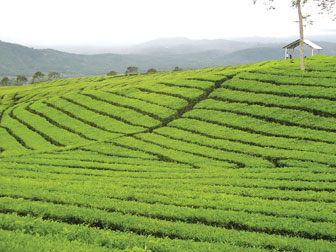Tea industry to get greener
by Gamini WARUSHAMANA
The tea industry of Sri Lanka is looking forward to be greener by
introducing sustainable and environmental friendly cultivation practices
and make strong eco-friendly tea brands. Forest Garden Tea (FGT) is a
new tea brand introduced by Sri Lanka. A full day seminar was organised
to make strong Public-Private partnership to promote FGT cultivation by
Rainforest Rescue International last week.
 The seminar emphasised the need for the transformation of Sri Lanka’s
tea cultivation to more responsible environment friendly sustainable
cultivation methods. For over a century the Sri Lanka tea industry has
grown to a strong position. Its contribution to the national economy is
huge. It has the most famous Ceylon Tea brand. However, the industry has
destroyed vast areas of valuable forests and eco systems in Sri Lanka
and the destruction continues as a result of unsustainable conventional
cultivation practices. The seminar emphasised the need for the transformation of Sri Lanka’s
tea cultivation to more responsible environment friendly sustainable
cultivation methods. For over a century the Sri Lanka tea industry has
grown to a strong position. Its contribution to the national economy is
huge. It has the most famous Ceylon Tea brand. However, the industry has
destroyed vast areas of valuable forests and eco systems in Sri Lanka
and the destruction continues as a result of unsustainable conventional
cultivation practices.
Deforestation continues for new cultivations and causes environment
issues such as soil erosion, reduced water security and bio diversity.
Excess use of chemical fertiliser and other agro chemicals have created
multiple environment and health issues.
The industry has also faced various issues due to these environmental
impacts. The cost of production of tea has continuously increased over
the last decades. Productivity of the plantation sector is reducing and
today the plantation sector accounts for only for 30 percent of the
green tea leaves produced although the sector covers 60 percent of total
tea lands, speakers at the seminar said.
The Deputy General Manager of Tea Small Holdings Development
Authority Cyril Manikkage said that with the shift to organic farming,
tea small-holders can get a lot of benefits. Sri Lanka’s tea replanting
rate is very low and is at 1 percent and this is common in
small-holdings as well as the plantation sector. The reason is low
investment on replanting. The high input cost is a reason for the lower
replanting rate.
Farmers get subsidised fertiliser and it is a relief to them. Non
availability of skilled workers, land degradation and unaffordability of
modern agriculture practices are the three other issues faced by the
small-holders, he said.
Director, Tea Research Institute (TRI) Dr. Sarath Abeysinghe spoke of
the recent research of the TRI on organic tea farming. There were
several concepts in our tea industry and earlier we focused on value
addition. Today we talk about different concepts-organic farming and
eco-friendly tea cultivation. The most important thing is introducing
these concepts to the small-holders who account for the bulk of the
green tea supply.
In the 1950s we shifted to VP teas and achieved much. Yield and
productivity increased significantly but it narrowed down genetic
diversity of tea. Today we have successfully tested seed tea verities
that are with high yield and some qualities such as drought resistance,
he said.
Koen van Laar of the Royal Netherlands Embassy said that the demand
for organic products is increasing and consumers are willing to pay more
for products that are produced in an environment friendly manner.
The Netherlands government is interested in this project and decided
to support it. Colombia produces rainforest coffee and Sri Lanka is now
ready to produce tea. This move will increase profitability of the Sri
Lankan tea industry and make it sustainable, he said.
Forest Garden Tea is something beyond organic tea. Organic
cultivation is only one aspect. It will be the finest tea in the world
that gives you excellent taste and aroma as well as provide a home for
wild life, grown in a system that protects the environment and gives
better income to growers. Forest Garden products are certified as being
produced in a holistic environment that ensures clean organic products,
farm sustainability, social equity, bio diversity conservation and
reduction in carbon foot print.
Organic tea production in Sri Lanka has increased from 0.78 percent
in 1987 to 3.3 percent in 2010. Productivity is around 400-576 kg of
made tea/ha and it is less than the yield of conventional tea.
|

